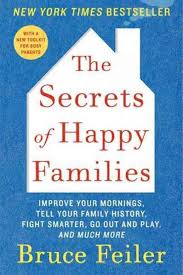As parents, I think we all have an ideal that we’d like our family to look like. We want that Christmas-card image of the perfectly scrubbed, neatly dressed, happy, every-hair-in-place family to be true in our every day lives. The children would listen the first time we asked, we’d all laugh lots and play together, and we’d never yell or get mad at each other. However, most of the time, that doesn’t happen. Life gets busy. Children (and parents) get over-tired. Disagreements erupt. So how can we reconcile reality with that desire for a happy family?
 In his new book The Secrets of Happy Families: Improve Your Mornings, Tell Your Family History, Fight Smarter, Go Out and Play, and Much More, BruceFeiler gives families a new toolbox. He examines techniques that have been successful for business and other groups and applies those to family dynamics. His book is full of practical suggestions, real-life examples, and suggestions about why these ideas actually work.
In his new book The Secrets of Happy Families: Improve Your Mornings, Tell Your Family History, Fight Smarter, Go Out and Play, and Much More, BruceFeiler gives families a new toolbox. He examines techniques that have been successful for business and other groups and applies those to family dynamics. His book is full of practical suggestions, real-life examples, and suggestions about why these ideas actually work.
For example, Chapter 1 is about “The Agile Family Manifesto,” in which a software engineer applied a system of group dynamics from his workplace to his family. Treating the family as a team and having weekly family meetings transformed the stress and day-to-day functioning of the family. It even made big family gatherings like Thanksgiving much easier because everyone had a role to play. Bruce explains,
“In effect, what agile accomplishes is to accept that disorder and order live alongside each other. By acknowledging things will go wrong, then introducing a system to address those wrongs, you increase the odds that the system—in this case the family—can work right.”
I appreciated the way that Bruce offered some unique ideas for parenting—and yet these ideas weren’t really new or unique. They are ideas that have worked in other contexts and just never been applied to families before. It made me think that parenting isn’t really rocket science—it’s just common sense, but sometimes we get so caught up in our busy-ness and even in our desire for perfection that we make it more complicated than it is.
In each chapter, Bruce introduces a new family who is doing something unique to make things work for them. From family meetings to family breakfasts, allowances to home organization, and tough topics like “The Talk,” Bruce presents tips and ideas that have worked for other families—and analyzes why they work. For example, we’ve all heard that eating meals together as a family is important. However, for many of us, our schedules make that tough to do. Bruce suggests some alternatives, but also looks at WHY mealtimes are so crucial. He suggests that part of it is hearing the family stories and being a part of a bigger picture:
“What generates the sense of attachment and emotional toughness is the process of hearing all those old stories and seeing yourself in the larger flow of your family. In other words, what we think of as family dinner is not really about the dinner. It’s about the family.”
At the end of the book, Bruce includes The Happy Families Toolkit, with resources for improving your family’s daily routine, creating your family brand, and narrating your family’s history. There is also a Discussion Guide (useful if you use this book in a mom’s or parent’s group) and a Select Bibliography (if you want to read more about any of the topics discussed by Bruce). Throughout the book, Bruce provides charts and pictures of what he’s discussing, such as the examples of his Family Mission Statement in Chapter 3.
Bruce Feiler is columnist for The New York Times and the author of six best-selling books. He’s also a former circus clown, TV host and popular lecturer. He lives with his wife and identical twin daughters in Brooklyn, New York. He was named “Father of the Year” by the National Fatherhood Initiative and his face appears on a postage stamp in the Grenadines. For more about Bruce and his books, drop by his website. Or check out his TED Talk about Agile Parenting:

No Responses Yet